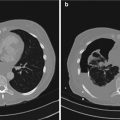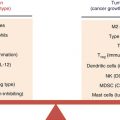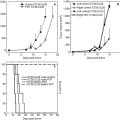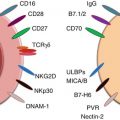Fig. 24.1
This is a proposed schema for intensive immune monitoring. Flow cytometry can be performed on peripheral blood to analyze multiple parameters for T cell activation/exhaustion markers, regulatory T cells, and MDSCs. If tumor tissue is available, immunohistochemical characterization of the cellular populations present as well as gene expression array or RT-PCR can be performed. For tumor types such as melanoma where the expression of differentiation antigens or cancer-testis antigens occurs at a high frequency, tumor antigen (TA)-specific antibody responses in peripheral blood could be analyzed by ELISA and protein array. TA-specific T cell immune responses can also be characterized in both peripheral blood and the tumor. Immunohistochemistry and/or RT-PCR can also confirm protein or RNA expression of the TA
Current immunological assays vary largely in their ability to consistently correlate immune response to clinical outcome. However, three concurrent phenomena will hopefully move immune monitoring forward: the advent of new immune monitoring techniques, an exponential rise in the number of patients treated with anti-CTLA4 therapies on clinical trials and in standard clinical practice, and an increasing awareness of the imperative to conscientiously and consistently bank patient tumor and blood specimens for these assays. Ultimately, it is hoped that the convergence of all these factors will enable immune monitoring strategies to identify robust and validated biomarkers that are prognostic and/or predictive and which can guide further clinical trial development.
Acknowledgements
This chapter is dedicated to the memory of Dr. Lloyd Old, our mentor and friend and one of the true leaders in investigational cancer immunotherapy. His many profound insights inspired much of our group’s immune biomarker studies.
References
1.
Brunner MC, Chambers CA, Chan FK, Hanke J, Winoto A, Allison JP. CTLA-4-Mediated inhibition of early events of T cell proliferation. J Immunol. 1999;162(10):5813–20.PubMed
2.
3.
Hodi FS, O’Day SJ, McDermott DF, Weber RW, Sosman JA, Haanen JB, et al. Improved survival with ipilimumab in patients with metastatic melanoma. New Engl J Med. 2010;363(8):711–23.PubMedCentralPubMedCrossRef
4.
5.
Topalian SL, Hodi FS, Brahmer JR, Gettinger SN, Smith DC, McDermott DF, et al. Safety, activity, and immune correlates of anti-PD-1 antibody in cancer. New Engl J Med. 2012;366(26):2443–54.PubMedCentralPubMedCrossRef
6.
Atkins MB, Lotze MT, Dutcher JP, Fisher RI, Weiss G, Margolin K, et al. High-dose recombinant interleukin 2 therapy for patients with metastatic melanoma: analysis of 270 patients treated between 1985 and 1993. J Clin Oncol. 1999;17(7):2105–16.PubMed
7.
Slovin SF, Higano CS, Hamid O, Tejwani S, Harzstark A, Alumkal JJ, et al. Ipilimumab alone or in combination with radiotherapy in metastatic castration-resistant prostate cancer: results from an open-label, multicenter phase I/II study. Ann Oncol. 2013;24(7):18–21.CrossRef
8.
Sprinzl MF, Galle PR. Facing the dawn of immunotherapy for hepatocellular carcinoma. J Hepatol. 2013;59(1):1–9.CrossRef
9.
Genova C, Rijavec E, Barletta G, Sini C, Dal Bello MG, Truini M, et al. Ipilimumab (MDX-010) in the treatment of non-small cell lung cancer. Exp Opin Biol Ther. 2012;12(7):939–48.CrossRef
10.
11.
Grosso JF, Jure-Kunkel MN. CTLA-4 blockade in tumor models: an overview of preclinical and translational research. Cancer Immun. 2013;13:5.PubMedCentralPubMed
12.
13.
Attia P, Phan GQ, Maker AV, Robinson MR, Quezado MM, Yang JC, et al. Autoimmunity correlates with tumor regression in patients with metastatic melanoma treated with anti-cytotoxic T-lymphocyte antigen-4. J Clin Oncol. 2005;23(25):6043–53.PubMedCentralPubMedCrossRef
14.
15.
16.
Berman D, Wolchok JD, Weber J. Association of peripheral blood absolute lymphocyte count (ALC) and clinical activity in patients (pts) with advanced melanoma treated with ipilimumab. J Clin Oncol. 2009;27(15 Suppl):abstr 3020.
17.
Ku GY, Yuan J, Page DB, Schroeder SE, Panageas KS, Carvajal RD, et al. Single-institution experience with ipilimumab in advanced melanoma patients in the compassionate use setting: lymphocyte count after 2 doses correlates with survival. Cancer. 2010;116(7):1767–75.PubMedCentralPubMedCrossRef
18.
Postow M, Yuan J, Panageas KS, Chang M, Ku D, Wolchok JD. Evaluation of the absolute lymphocyte count as a biomarker for melanoma patients treated with the commercially available dose of ipilimumab (3 mg/kg). J Clin Oncol. 2012;30(Suppl):abstr 8575.
19.
20.
21.
Yang AS, Kendle RF, Ginsberg BA, Roman A, Heine AI, Pogoriler HE, et al. CTLA-4 blockade with Ipilimumab increases peripheral CD8+ T Cells: Correlation with Clinical Outcomes. J Clin Oncol. 2010;28(15 Suppl):abstr 2555.
22.
Phan GQ, Yang JC, Sherry RM, Hwu P, Topalian SL, Schwartzentruber DJ, et al. Cancer regression and autoimmunity induced by cytotoxic T lymphocyte-associated antigen 4 blockade in patients with metastatic melanoma. Proc Natl Acad Sci U S A. 2003;100(14):8372–7.PubMedCentralPubMedCrossRef
23.
Maker AV, Yang JC, Sherry RM, Topalian SL, Kammula US, Royal RE, et al. Intrapatient dose escalation of anti-CTLA-4 antibody in patients with metastatic melanoma. J Immunother. 2006;29(4):455–63.PubMedCentralPubMedCrossRef
24.
Maker AV, Phan GQ, Attia P, Yang JC, Sherry RM, Topalian SL, et al. Tumor regression and autoimmunity in patients treated with cytotoxic T lymphocyte-associated antigen 4 blockade and interleukin 2: a phase I/II study. Ann Surg Oncol. 2005;12(12):1005–16.PubMedCentralPubMedCrossRef
25.
26.
Comin-Anduix B, Lee Y, Jalil J, Algazi A, de la Rocha P, Camacho LH, et al. Detailed analysis of immunologic effects of the cytotoxic T lymphocyte-associated antigen 4-blocking monoclonal antibody tremelimumab in peripheral blood of patients with melanoma. J Transl Med. 2008;6:22.PubMedCentralPubMedCrossRef
27.
Carthon BC, Wolchok JD, Yuan J, Kamat A, Ng Tang DS, Sun J, et al. Preoperative CTLA-4 blockade: tolerability and immune monitoring in the setting of a presurgical clinical trial. Clin Cancer Res. 2010;16(10):2861–71.PubMedCentralPubMedCrossRef
28.
Wang W, Yu D, Sarnaik AA, Yu B, Hall M, Morelli D, et al. Biomarkers on melanoma patient T cells associated with ipilimumab treatment. J Transl Med. 2012;10:146.PubMedCentralPubMedCrossRef
29.
Liakou CI, Kamat A, Tang DN, Chen H, Sun J, Troncoso P, et al. CTLA-4 blockade increases IFNgamma-producing CD4+ICOShi cells to shift the ratio of effector to regulatory T cells in cancer patients. Proc Natl Acad Sci U S A. 2008;105(39):14987–92.PubMedCentralPubMedCrossRef
Stay updated, free articles. Join our Telegram channel

Full access? Get Clinical Tree







